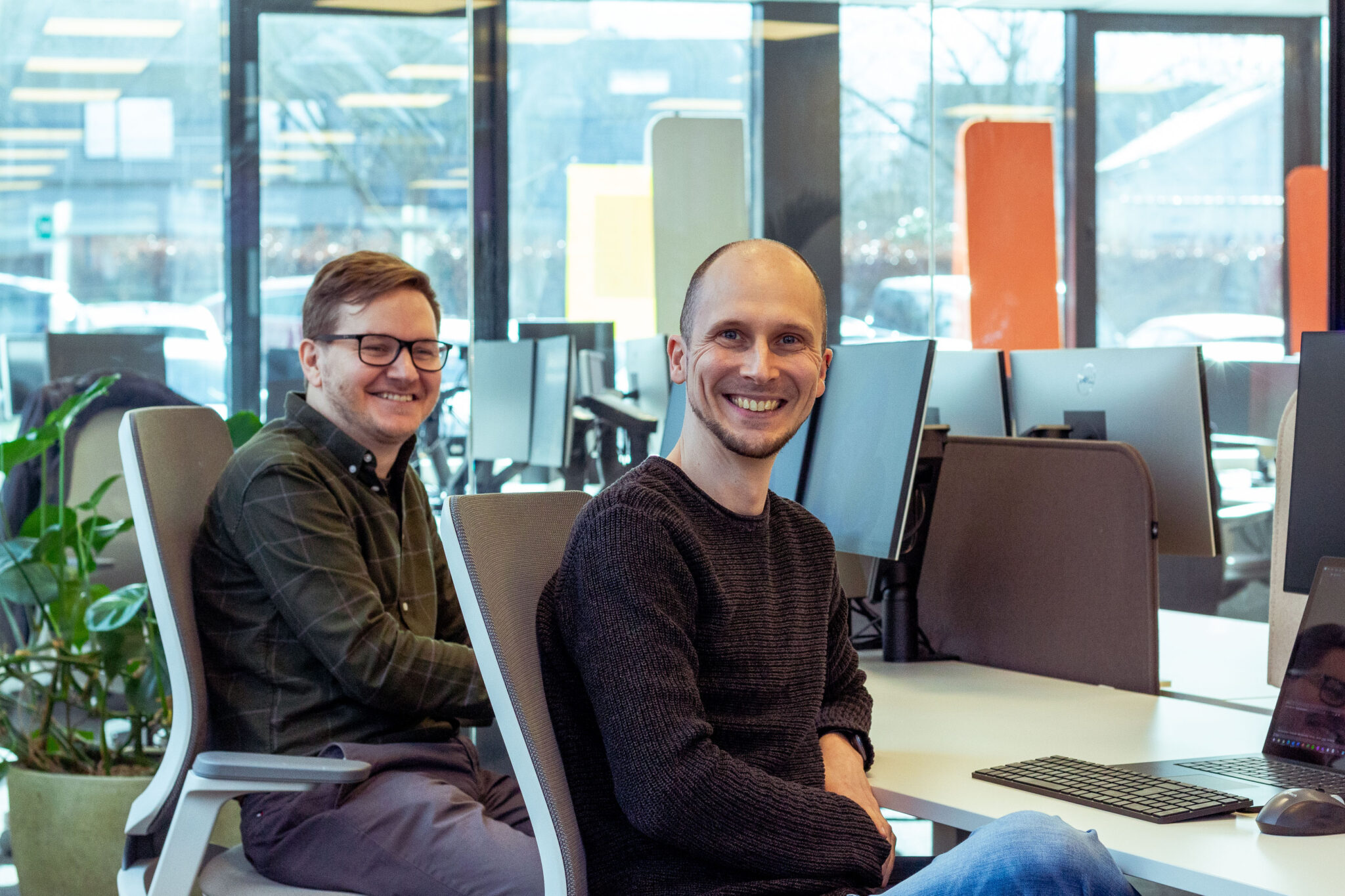The onboarding process at CloudFuel: full steam ahead!
24.01CloudFuel is a relatively young company within Cronos. In addition to its front men, Kim & Brecht, the team boasts two more crucial members: meet Dennis Present and Maarten Ghijsens. Two Azure Cloud Native Architects who let us experience their onboarding and the way of working at this booming start-up!
Your job titles are quite a mouthful. What exactly is it you do?
MAARTEN: At CloudFuel, both Dennis and I are Azure Cloud Native Architects. That means we primarily help customers to modernize their applications. Mainly, we’re asked to analyse both the infrastructure and architecture of existing apps. That leads to an advice and an approach, clarifying how to redesign the applications, always from a cloud-first mindset. Lastly, we can also assist or coach clients to achieve their desired result. Cloud-native applications are our specialism.
What made you want to start working there?
MAARTEN: I wanted to work in a team. Collaborate and learn from your colleagues instead of being isolated on my own little island. I mostly missed a challenge: I wanted to get back into development and architecture, for custom applications, and not just for Office 365 applications or integration. I told Brecht and Kim that, and they take it into account. The cloud-first mindset is another key aspect for me. At some point, a customer needs to modernize their legacy applications and I wanted to work on that.
DENNIS: I said “yes “ because the challenge is so great here. Every project entails new tech—so you can keep learning and you don’t get stuck on a single technology. Also, the connection to Microsoft is rather unique here, and that spoke to me. You get sneak peeks, which means you’re always at the cutting edge of what’s happening in the market.
What was the job application process like for you both?
DENNIS: I talked to several people. About CloudFuel itself, about my position, and about the technical aspects. During these discussions, we tested the waters, looking for common ground and to see whether we were a good fit. For private reasons, I wanted to maintain flexibility—a lack of which led to stress in the past, so I definitely voiced my doubts in that regard. We’ve managed to arrange things quite well, so my fears were quickly dispelled.
MAARTEN: Everything went smoothly for me. I spent some time considering all the angles, because I had several opportunities and wanted to make the right call. In the end, I opted for CloudFuel because I really enjoyed the transparent communication. I could clearly tell Kim and Brecht what things were bothering me. Being a consultant is stressful, so there are certain things you like to agree on before getting started.
How did the onboarding process go?
MAARTEN: Without a hitch! All the necessaries had been taken care of and I was immediately given the space to attend training sessions during working hours. I was venturing into a whole new world, and I still had a lot to learn. Kim & Brecht guided me through the different training opportunities and indicated which would be interesting for me. Personally, I appreciated that approach.
DENNIS: They had a number of projects in the pipeline when I got started, and because I knew what technology I would be working with, I was able to come well-prepared. I definitely felt like I had a say in my projects. I can always tell Kim & Brecht when a project no longer holds my interest. They’re open to that kind of feedback, which is reassuring.
How do you feel about the corporate culture?
MAARTEN: I absolutely did not want to be outsourced for a long period of time, because team spirit is very important to me. I don’t want to be the only person at the customer with the expected expertise. In that sense, the way we work is fantastic for me. It’s great being able to learn directly from a colleague, not having to find everything out by yourself.
DENNIS: We’re based at CloudFuel, not on-site at the customer. Also, we don’t work full-time on a single project, but we switch between projects as a team. Large-scale projects, especially, are real team efforts. They’re great for knowledge sharing and, particularly, to stay connected as colleagues. We also hold regular meetings and make sure to arrange to see each other in the office.
Isn’t it hard to maintain that sense of teamwork when working remotely?
MAARTEN: It’s all a matter of making time for each other. At my previous employer, I noticed that everyone was working on their own. Dennis and I often ask each other questions and help each other. That’s all you need, really. It’s all about the mindset: we can count on each other. That also goes for Kim and Brecht. Even though they’re technically our bosses, they’re keeping an interested eye on things.
DENNIS: Working from home sometimes makes things more difficult. But it’s all about how you take responsibility. I like working from home, but I’m glad we come to office every now and then to meet up. Definitely when you’re starting out somewhere new, remote work is tricky when trying to make personal connections. But things should definitely improve once the pandemic finally cools down. Team events have already been planned, I noticed, so I’m sure all will be well.
What makes working at CloudFuel so much fun? What would you say to potential new applicants?
MAARTEN: The transparent communication, the pleasant collaboration, the innovative aspect, and much more. It’s a combination of several factors—the complete package.
DENNIS: You get tonnes of freedom and can shape your path the way you want. There is a wide range of projects and technologies to work on, and your wishes are taken into account.
Are you—just like Dennis and Maarten—fascinated by CloudFuel and has this interview convinced you to follow in their footsteps? Then click here, and before you know it, we’ll touch base and see what’s possible. Talk to you soon?





